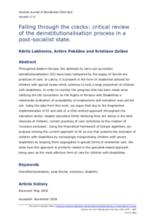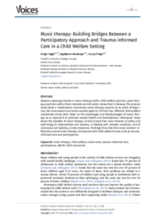

Displaying 951 - 960 of 1647
Using the findings from a qualitative study, this paper explores social workers’ experiences of intervening in affluent families in the UK when there are child protection concerns.
Using the data from a a nationwide evaluation of accessibility of employment and education in Latvia, the authors of this paper argue that due to the fragmented implementation of deinstitutionalisation (DI) and lack of a child centred approach throughout the education sector, despite educators firmly believing they are acting in the best interests of children, current practices of care contribute to the creation of ‘inclusive exclusion’
Despite a growing interest in music therapy within child welfare practice, music therapy practices within these contexts are still under-researched in Norway. The present study takes a collaborative community music therapy practice as its point of departure.
In this blog post from the Huffington Post, Rachel Springford writes about her experience in care and the difficulties care leavers face in transitioning to adulthood and accessing opportunities such as studying at university.
The UK government has announced a new care leaver covenant, designed to support care leavers in the transition to independent adulthood, according to this article from the Guardian.
This article re‐examines data from an evaluation of a volunteering project for care leavers in the UK.
This chapter examines Global North and South similarities in children and young people’s reactions to school-led child protection programmes.
This segment from Roundtable explores the issue of voluntourism and its potential to yield harmful impacts. The participants, including Georgette Mulheir the CEO of Lumos, discuss orphanage voluntourism among other forms of voluntourism.
This paper is based on findings from an Irish study of permanence and stability outcomes for children in long-term care which involved biographical narrative interviews with 27 children, young people, parents and foster carers.
This briefing paper provides general background on the development of UK Government policies to support care leavers, and existing support available in key areas such as: social services; housing; education and training; health services; and the social security system.



